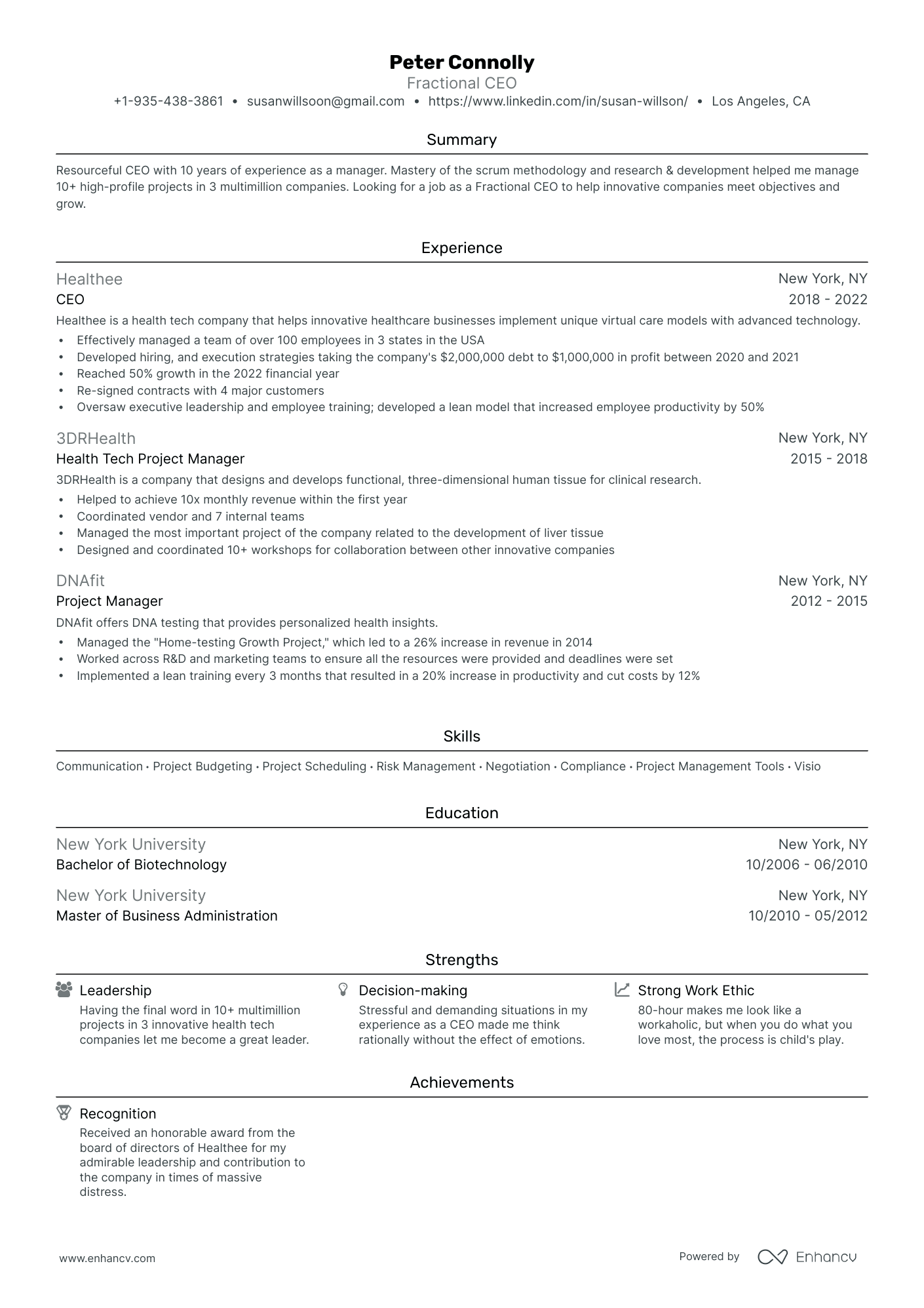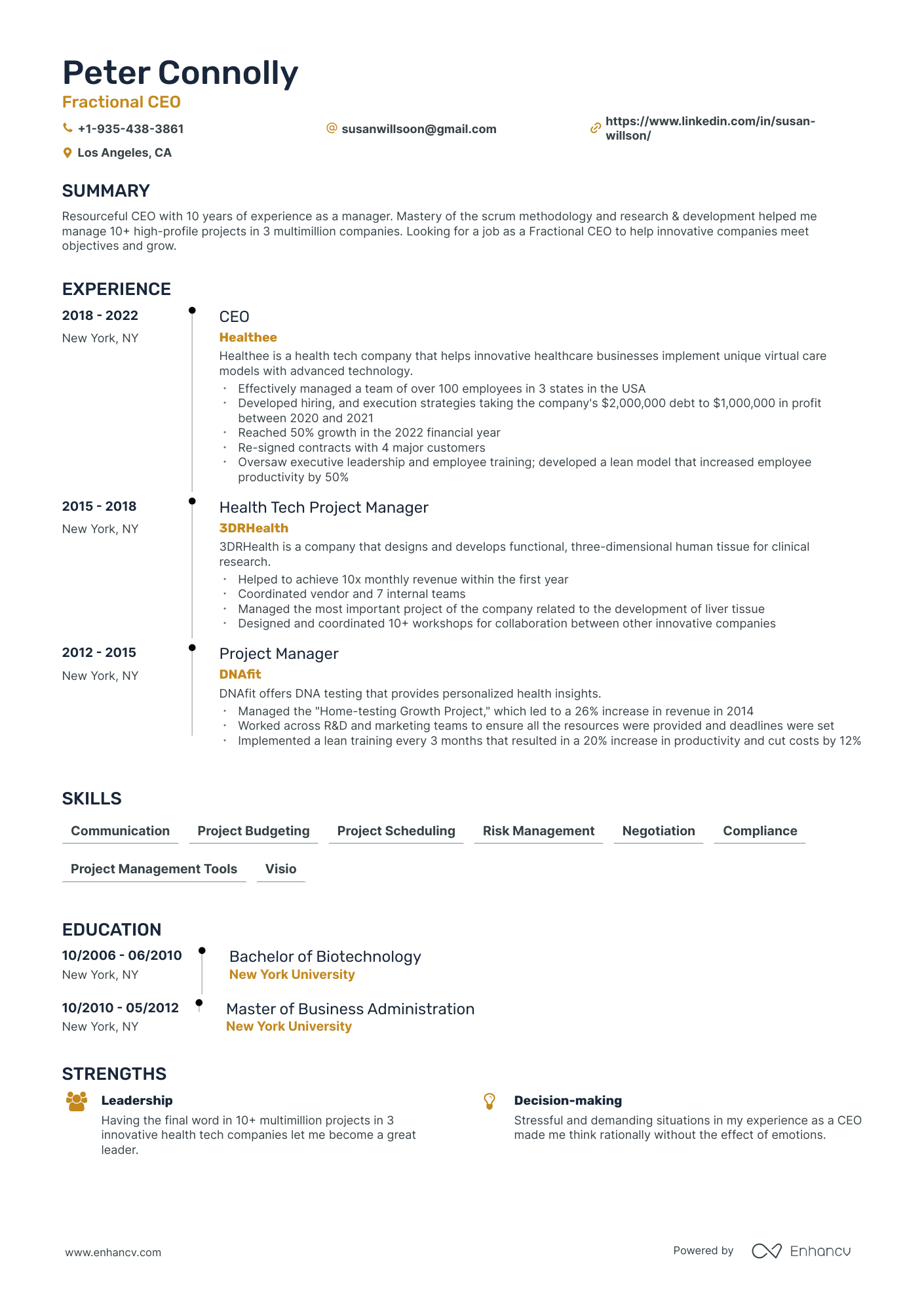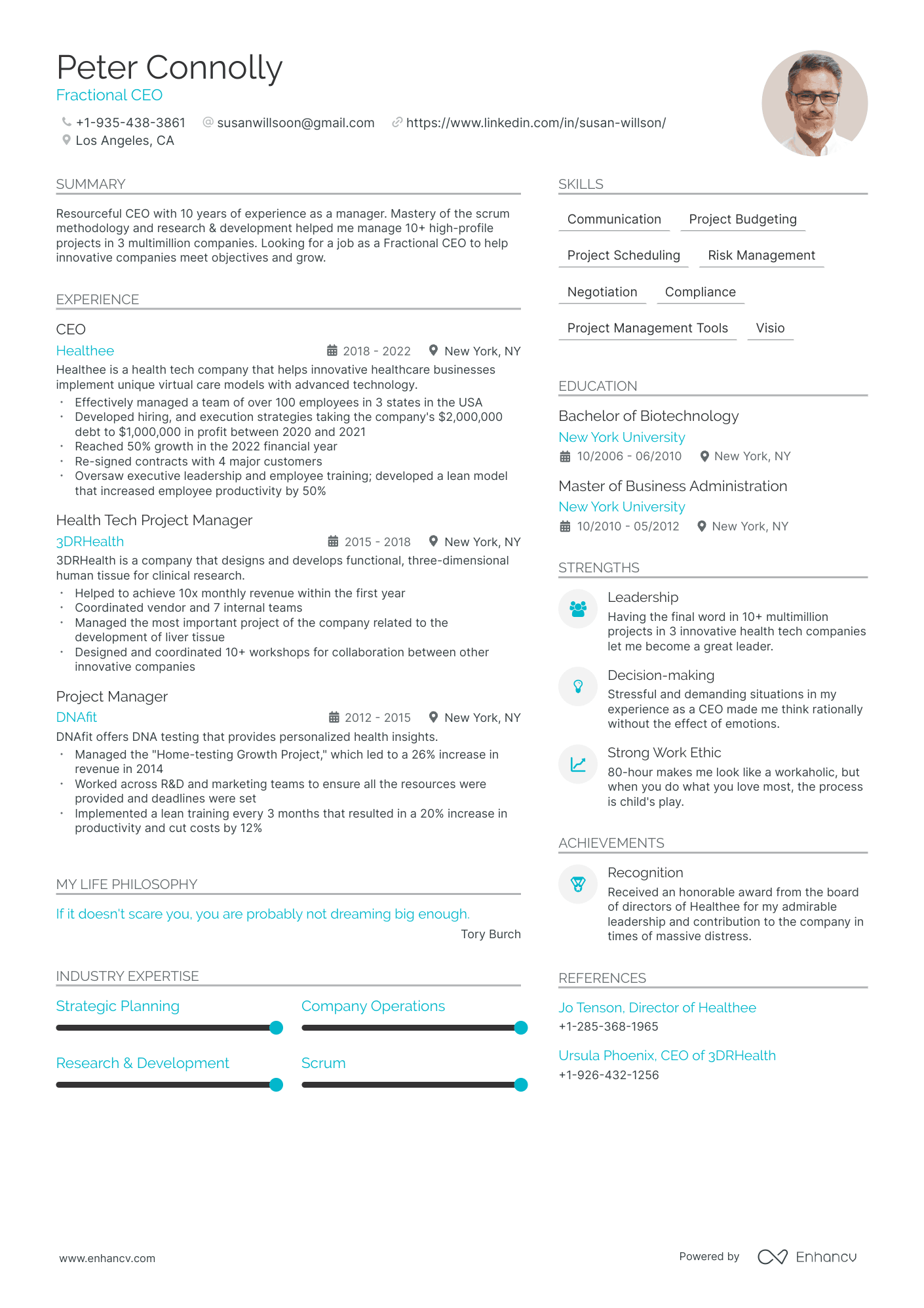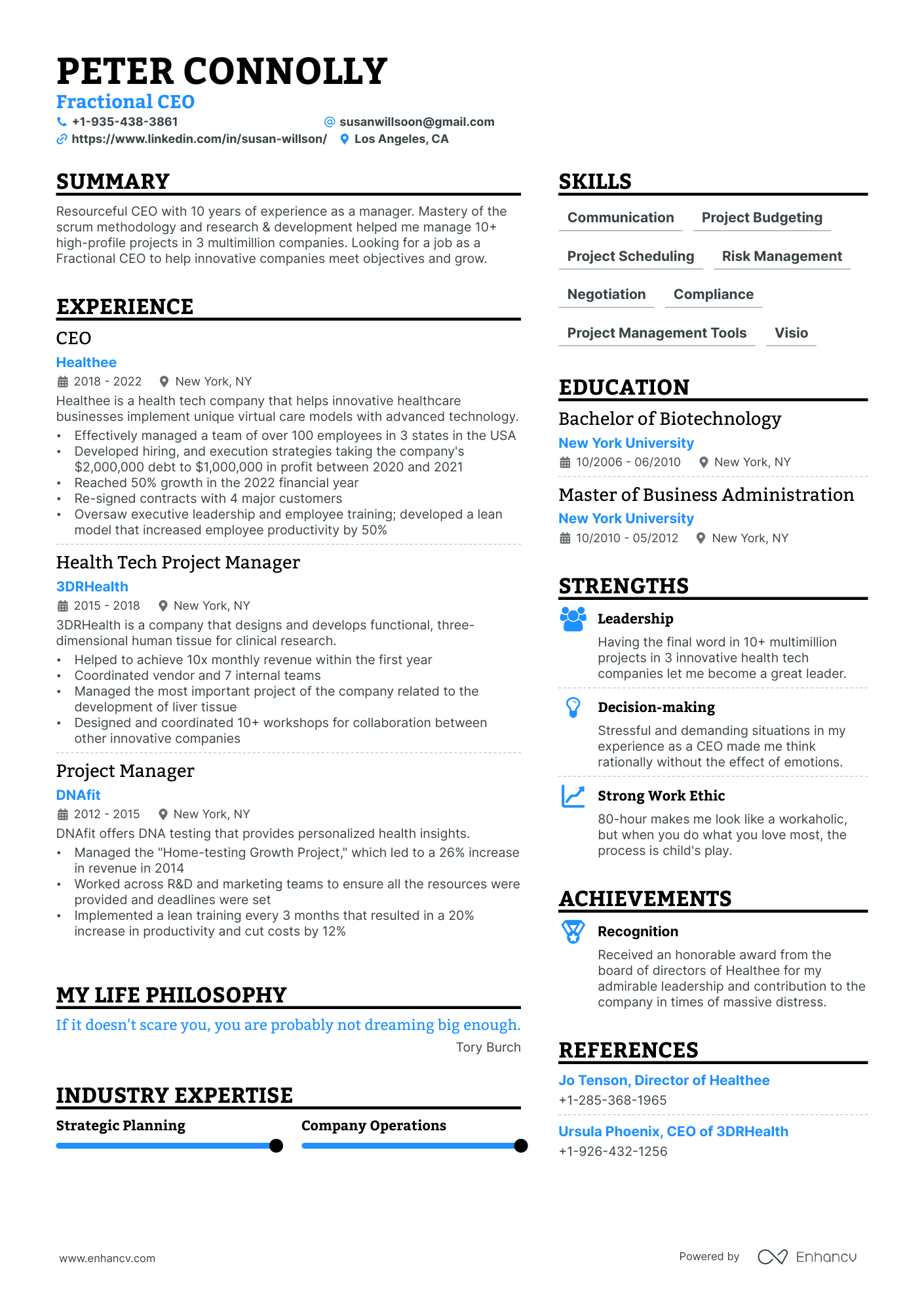Being a CEO is one of the most challenging jobs in the world.
Unsurprisingly, it also attracts many professionals, which makes the competition fierce.
The fractional CEO position hides specifics every applicant should be aware of.
Thankfully, recruiters are looking for qualities not related to expertise only.
And guess what!
We know all the tips and tricks that will impress recruiters!
Examine this ultimate fractional CEO guide, and then utilize the resume builder to create your own.
What you’ll learn here:
- How to create a well-structured Experience section that catches the eye of recruiters
- How to write a short and precise summary supported by facts, numbers, and active verbs
- How to balance your skills to correspond to every other section of the resume
Looking for related resumes?
- CEO Resume Guide
- CTO Resume Guide
- CMO Resume Guide
- CIO Resume Guide
- CCO Resume Guide
- Vice President Resume Guide
- Department Head Resume Guide
- Executive Resume Guide
- General Manager Resume Guide
- Managing Director Resume Guide
- Director Resume Guide
How to write a fractional CEO resume
There are 2 reasons why recruiters would hire a fractional CEO:
- The company is struggling and needs a bright spark and a clear direction.
- They need a leader with a growth mindset who will take the brand to the next level of success.
However, the critical factor that defines the outcomes of your application is expertise.
A fractional CEO is someone who:
- builds respect in employees and customers,
- has a vision, can build strategies and execute them,
- is a go-getter
If you cannot come up with ideas, ask yourself similar questions:
What did I achieve as a CEO before? How many success stories can I tell?
Did I inspire the people around me? Did my growth strategy make the brand's audience stronger?
What kind of problems did I solve? Did I make the right decisions, and what were the results of them?
It's crucial to add the My Philosophy and References sections.
Thus, you prove to share a specific set of values that people support.
Support the skills you mention in the Experience and Strengths sections.
This way, recruiters are more likely to believe in what you present in your fractional CEO resume.
Continue reading the guide and learn some unique tricks and tips to stay on the top of the employer's list.
Fractional CEO resume formats
Here are some resume formats that are a good fit for you:
- Reverse-chronological resume is suitable for candidates with a couple of years in a specific industry.
- Functional resumes underline transferable skills and expertise.
- Hybrid resume combines the best features of the previous two formats.
Here are more resume tips:
- Choose 12p resume font size and 10’ resume margins
- Proper grammar and spelling are a must
- The PDF format is your best friend
- MS Word resume templates are widely accepted
Attention! To fill up the gaps in your resume, add References, My Philosophy, and Day of My Life sections (Enhancv's indigenous ones).
Your resume should match the market – Canadian applications, for instance, may use a different layout.
Top resume sections for a fractional CEO:
- Strong expertise that supports skills and strengths as well as underlines achievements
- Straight-to-the-point summary backed up with quantitative data
- Achievement section that makes you stand out
- Day of My Life section that emphasizes your time management skills
- My Philosophy and References sections make you look trustworthy
What recruiters want to see on your resume:
- Do you have solid experience in managing daily company operations and people?
- How does your vision for the future align with one of the companies you are applying to?
- Is your hard work recognized by colleagues, employees, or the board of directors?
- What is your life philosophy? How can your beliefs maintain and support the company culture?
- Are you a great leader? Do you have exceptional decision-making and communication skills?
Attention-grabbing fractional CEO header
Sometimes confidence makes you blind.
You are unable to see that the small details, such as including contacts, might reduce the chances of getting the job.
Why?
Because successful CEOs are thinkers who utilize neglectable details to their advantage.
Therefore, you need to make a top-notch introduction in the Header section.
Here are some tips on how to do so:
- Write down your first and last name corresponding to your social profiles
- Mention the position you are applying for; you can be as creative as you wish
- Don't forget to provide your phone number, professional email, and current location
- Include a link to your portfolio or LinkedIn profile
Examine the samples below and learn from the mistakes of the first candidate to build a coherent resume header.
2 fractional CEO resume header examples
Fractional CEO summary that inspires
It's hard not to point at others when things don't work out.
Like it or not, to be a successful fractional CEO, you should be the person who:
- takes responsibility
- does not complain about hardships
Because you should be the leader, the true go-getter, the person that inspires others to take action.
So, to avoid failure and write a top-notch resume summary:
- highlight years of experience, industry, and extraordinary achievements requiring extraordinary devotion,
- list skills that are a scarcity,
- back up facts and statements with power words, quantitative data, and action verbs,
- underline your vision for the future in the position you are applying for.
Optimize your resume summary and objective for ATS
Drop your resume here or choose a file.
PDF & DOCX only. Max 2MB file size.
2 fractional CEO resume summary examples
Do you spot the difference?
While the first candidate is winning in mediocrity, the second is getting the job position for sure!
Nobody pays attention to general and vague information.
Recruiters will ignore it for sure.
Therefore, give 100% of your time and energy to valuable content.
How to take the headache out of fractional CEO experience
As mentioned above, you have 2 crucial tasks to accomplish on your resume.
The first one is to provide evidence for problem-solving skills.
Show how you helped companies become industry leaders after being close to bankruptcy.
Thus, you show you are a game changer, the hidden weapon in times of crisis.
Secondly, it's vital to indicate]e growth mindset and leadership skills.
Every business in a specific industry is fighting for a bigger piece of the pie.
Show recruiters that you can help their company get more market share.
Here are some tips to follow when building the Experience section:
- Underline extraordinary achievements: successful projects, revenues, feedback from supporters
- Skills that describe you as a true leader who inspires others: show how your brand became more popular
- Mention how you solved serious trouble and turned it into an opportunity for the business
- Demonstrate leadership skills by explaining how you made the right decision when needed
We offer you one good and one bad example so as to take notes and learn how to work experience on a resume:
- •Managed a staff of many individuals from 2 continents
- •Developed a hiring plan that leveraged the results from talent acquisition
- •Created a lean approach that enhanced managers' productivity
- •Established valuable partnerships with many companies
- •Managed a staff of approximately 200+ individuals from 2 continents
- •Developed hiring plan that leveraged the results from talent acquisition by 29%
- •Created a lean approach that enhanced managers' productivity by 40%
- •Established 10+ valuable partnerships with multimillion-dollar companies
Pro tip:
Try to include power words such as "believe," "inspire," "vision," and "future" to make your statements look more authentic. They convey the feeling that you know your "why" as a human being and a professional.
Short story: the truth about fractional CEO skills
Do you know what makes the CEO position so special?
The ability to BALANCE.
But here we talk about the balance between soft and hard skills.
You cannot be a great leader with an exceptional work ethic without excelling at company operations and strategic planning.
Also, if you have a growth mindset, you should know how to manage risk.
If you are a CFO, you are great in finance, but you should communicate simply the numbers with the team to be understood.
See the top soft skills recruiters search in resumes and include some of them in yours.
6 top soft skills for fractional CEOs' resumes:
- Leadership
- Work Ethic
- Communication
- Growth Mindset
- Creativity
- Time Management
6 Top Hard Skills for fractional CEOs' Resumes:
- Company Operations
- Risk Management
- Project Scheduling & Budgeting
- Strategic Thinking
- Compliance
- Project Management Tools
As a CTO, you should back your skills with a cohesive Strengths section.
For instance, if you mention scrum mastery, you add clear examples of how you applied this methodology backed up with numbers.
Such a strategy will help you make you more trustworthy and increase your chances of getting hired by at least 50%!
Your CEO time: day of my life section
Time management is crucial when you are in the position of a leader.
Imagine that you are a CMO of a big corporation.
Your task is to gather the team and build a complex marketing strategy for the incoming Monday.
However, you have many other unimportant tasks, such as daily operations in the marketing department.
What are you supposed to do?
PRIORITIZE.
And the best way to prove your prioritizing and time management skills is with a Day of My Life diagram.
Look at the example below and then create yours:
Use fractional CEO achievements to make recruiters fall in love with you
Hard work and perseverance are rewarded sooner or later.
The example below proves when you love your job, it pays off!
However, sometimes giving 100% is not enough.
To impress recruiters with your achievements as a fractional CEO, you should tailor them to the job offer.
For example, mention how you helped a company that once was close to bankruptcy now is rapidly growing.
It's vital to support your statement with quantitative data!
Otherwise, it looks like a generic fact that adds no value.
Education section: is it worth adding it?
You might say:
"I'm a damn CEO; nobody cares what my education is!"
And you are right to some extent.
When you have a proven record of success in your industry and years-long expertise, it's useless to add an Education section.
However, if you apply for a CEO position in a healthcare company, you probably should need a degree in healthcare.
Take a look at the following tips to understand how to impress recruiters with your Education section on the resume:
- Mention how you gained leadership skills from your courses or extracurricular activities
- Demonstrate growth mindset: include participation in challenging projects and teamwork
- Highlight exceptional achievements that demonstrate self-motivation
- Add references from colleagues or tutors that describe you as a go-getter
Fractional CEO philosophy: you represent a brand
As a CEO, you should be well aware that you are the biggest and the brightest representation of the company’s brand.
If you apply for a position as a fractional CEO of Apple, you should mention and prove that you "think differently" indeed.
If your values align with those preached by the company, you are highly likely to get the position.
However, it's up to you to conduct extensive research!
When you are well-prepared, you reduce the chance of failure by at least 50%.
References: sign of respect
References are the most demonstrative form of respect.
If your colleagues, employees, or previous employers trust you, recruiters will also believe in you.
That's why it's vital to provide the person's name, position, and contact in your resume.
Thus, you indicate loyalty towards the company you work for.
Key takeaways
- Prove to be a great leader with a clear vision of the future and charisma that inspires
- Try to show with your experience that you are a problem-solver and a go-getter
- Highlight your greatest achievements in the summary section
- Add references from industry professionals and the Life Philosophy section to underline positive personality traits that align with those of the company
- Tailor each section to the job description by using power words, action verbs, and quantitative data




